Introduction
Ophthalmology grand opening chapter, all the friends gathered in Gusu. From November 11 to 12, 2023, the 5th Suzhou International Medical Imaging Symposium and the 3rd Suzhou International Ophthalmic Artificial Intelligence Forum was successfully held in Suzhou, which was jointly organized by the Medical Imaging Processing and Analysis Laboratory of Soochow University and the National Clinical Medical Research Center for Eye Diseases and organized by Suzhou Big Vision Medical.
In recent years, artificial intelligence (AI) has made amazing achievements in the fields of computer vision and medical image analysis. In the clinical diagnosis and treatment of ophthalmology, artificial intelligence has also shown broad application and market prospects. Big Vioion Medical focuses on the research and development of software and hardware systems for artificial intelligence analysis and diagnosis of ophthalmic imaging. It has established an industry-research-learning integration platform in cooperation with the Medical Image Processing and Analysis Laboratory of Soochow University, actively carried out the deep integration of school and enterprise resources, and promoted the transformation of scientific and technological innovation. So far, it has successfully cooperated with Suzhou International Ophthalmic Artificial Intelligence Forum for two times. In the golden autumn, the third forum was successfully held, attracting the participation of many professionals and scholars at home and abroad, showing the latest development results of artificial intelligence enabling ophthalmic imaging to the industry, accelerating the application of artificial intelligence technology in the field of ophthalmology, and playing a positive role in promoting the integration of industry, education and research as well as international exchanges.

Opening of the Conference
The conference opened in the Academic lecture Hall of Binglin Hall in Dushu Lake Campus of Soochow University. Professor Chen Xinjian from Soochow University, Professor Xu Xun from Shanghai First People’s Hospital, Professor Tian Jie from Beijing University of Aeronautics and Astronautics and Professor Milan Sonka from University of Iowa were the co-chairs of the conference. At the beginning of the conference, the chairman of the conference delivered a speech to express warm congratulations and sincere thanks to the guests, experts and industry colleagues attending the conference.
Academic forum
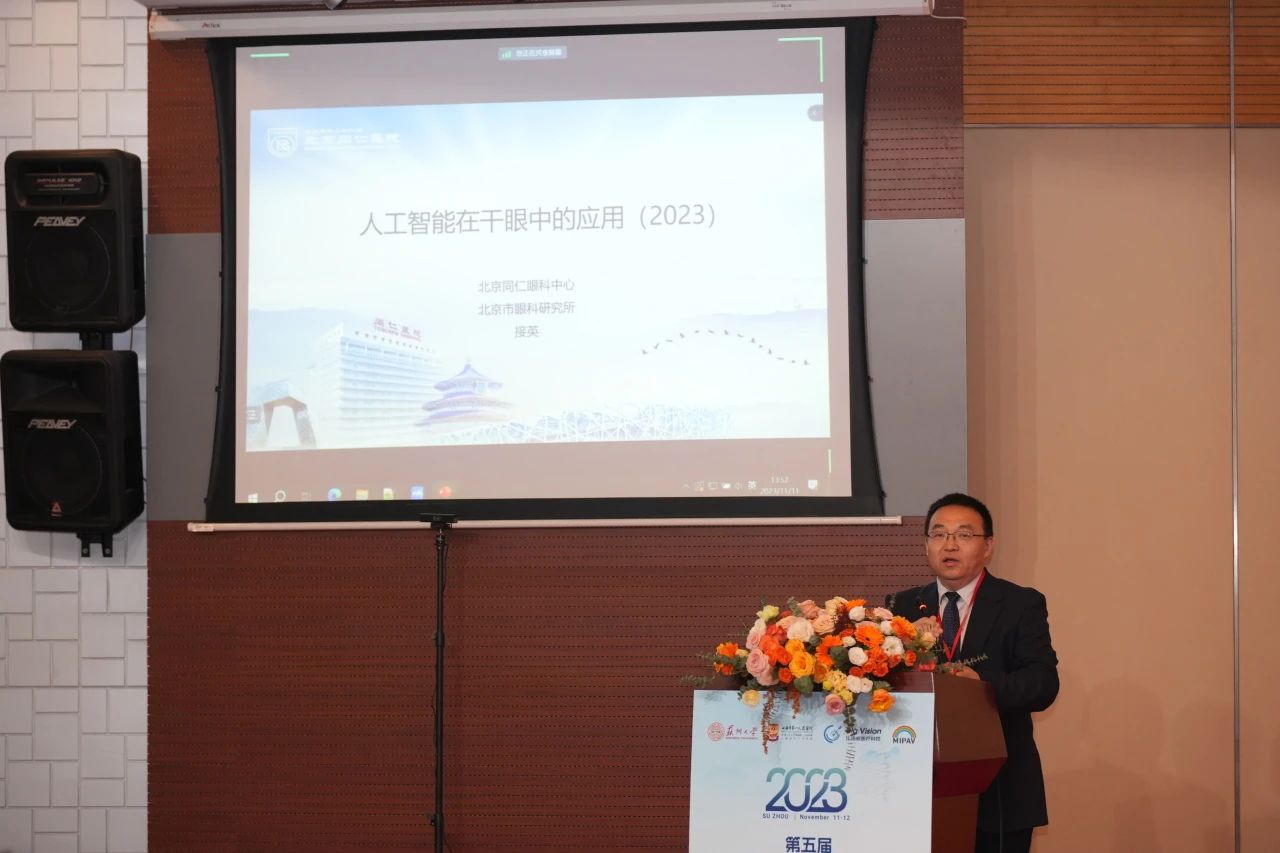
Professor Jie Ying from Beijing Tongren Hospital, Capital Medical University delivered a wonderful speech on the application of artificial intelligence in dry eye. Professor Jie Ying pointed out in the report that dry eye, as a chronic eye disease, is a major problem that plagues the national life, causing a heavy mental and living burden. However, the traditional examination methods are cumbersome and troublesome, resulting in inefficient detection procedures. In this regard, Professor Jie Ying proposed the examination principle of “from non-contact to contact, from non-invasive to invasive, from local to systemic”, and said that the introduction of artificial intelligence in the diagnosis of dry eye can effectively assist the diagnosis, and the evaluation is more accurate, diverse and efficient, which is of great clinical significance. Professor Jie Ying gave full approval to the artificial intelligence dry eye detector newly listed by Big Vision Medical, and praised it, “It can complete a number of comprehensive examinations, the report results are easy to understand, the examination data and classification level are clear at a glance, which is convenient for doctor-patient communication.”

Professor Zou Haidong, Vice president of Shanghai First People’s Hospital, gave a wonderful speech on “Strategy construction of artificial intelligence for sustainable eye disease screening”. Professor Zou Haidong raised a thought-provoking question during his report “What can artificial intelligence do for ordinary people?” And pointed out that “Shanghai’s medical resources are very rich compared with the whole country, but there are only 0.74 eye doctors in 10 000 people, which shows the serious shortage of eye doctors in other areas.” In this regard, Professor Zou Haidong said that eye health screening and prevention work in most areas has not been put in place. To solve the problem, “system improvement is the fundamental solution. Pursue the digitization of services rather than the digitization of technology.” The intervention of artificial intelligence is expected to change the current situation, such as establishing an intelligent management center for visual health in the community, and realizing large-scale eye disease screening at the grassroots level through automatic screening equipment, quality control platform, AI platform, and mobile terminal services.Professor finally Zou Haidong through sensitivity analysis for the first time put forward “after AI application effect on the application of the health services, is important to improve screening efficiency via” point of view.

Professor Wu Xixi from the First Affiliated Hospital of Guangxi University of Traditional Chinese Medicine delivered a wonderful speech on the clinical application of the eye health management platform for children aged 0-18 years. Professor Wu Xixi pointed out that 0-6 years old is an important period for children’s eye care and vision examination, and eye diseases during this period may affect children’s eye development if they are not diagnosed and treated in time. The use of an information platform to interface with a variety of intelligent vision and refractive screening equipment can greatly reduce the screening time, manpower and material resources investment, and improve the efficiency and accuracy of screening. The importance of vision screening for myopia prevention and control in children and adolescents aged 7-18 years should not be underestimated. During this period, children and adolescents are prone to suffer from pseudomyopia, true myopia, astigmatism or asthenopia, among which high myopia may lead to blindness. During the lecture, Professor Wu Xixi said that the current domestic ophthalmic equipment has made great progress in clinical efficiency and accuracy, especially in large-area vision screening and other functions, which is not inferior to foreign equipment, which is deeply felt in the experience of Big Vision medical equipment. And expressed the hope that domestic scientific research companies represented by Bigway Medical will get better and better on the road of high precision ophthalmic equipment research and development.
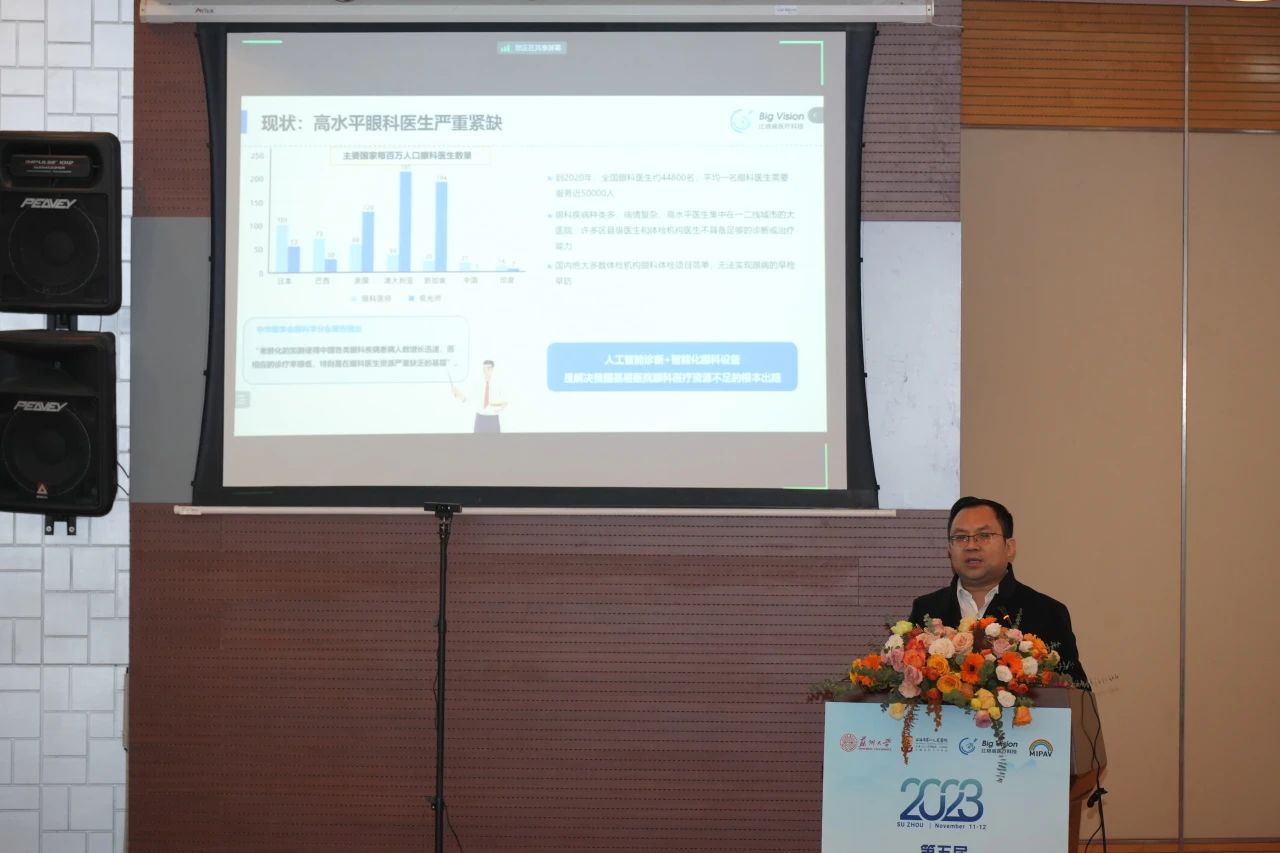
Professor Chen Xinjian, the founder of Big Vision Medical and Soochow University, gave a wonderful speech on “Artificial Intelligence diagnosis of ophthalmic Imaging”.Professor Chen Xinjian pointed out that there are many problems in the current situation of ophthalmic medical treatment, such as the wide prevalence of ophthalmic diseases, difficult to detect, and large market. In addition, there is a serious shortage of high-level ophthalmologists, especially in primary care.In this regard, Professor Chen Xinjian pointed out that “artificial intelligence + intelligent ophthalmic equipment is the fundamental way out to solve the shortage of ophthalmic medical resources in primary hospitals in China.”In addition, the latest development of artificial intelligence diagnosis of ophthalmic imaging was presented to the experts and scholars, involving multiple research directions such as fundus image classification and segmentation based on meta-learning, fundus color photography artificial intelligence diagnosis, and OCT artificial intelligence diagnosis of ophthalmic imaging.
Professor Chen also brought the research and development achievements of Bigway Medical intelligent ophthalmic equipment, including MIAS2000, the industry’s first multi-modal ophthalmic image storage processing and analysis system; MIAS3000 is expected to be approved by the world’s first OCT-assisted diagnosis category 3 certificate in June 2024, becoming the world’s first OCT-assisted diagnosis system approved for Category 3 certificate. OCT BV1000 series, automatic artificial intelligence; Visual acuity screening instrument BVS200 series is objective, fast and easy to use. The BVD6600 dry eye detector is comprehensive, intelligent and accurate. The AI biometer BVB2000 was submitted for inspection in September 2023, and the medical device registration certificate was obtained in June 2024. Bright lemon eye health intelligent management cloud platform, based on artificial intelligence diagnosis to empower business operations.
In addition to the above wonderful lectures, Prof. Milan Sonka of University of Iowa, Prof. Yali Jia of Oregon Health and Science University, Prof. Zhang Daoqiang of Nanjing University of Aeronautics and Astronausiology, Prof. Zhou Shaohua of University of Science and Technology of China, Prof. Han Junwei and Prof. Xia Yong of Northwestern Polytechnical University, Joint Shantou International Eye Center, Chinese University of Hong Kong, Shantou University Prof. Chen Haoyu, Prof. Chen Yang, Southeast University, Prof. Zhang Zhiqiang, Nanjing University, Prof. Tang Xiaoying, Southern University of Science and Technology, Prof. Hao F Zhang and Ulas Bagci, Northwestern University, Prof. Wu Xia, Beijing Normal University, Prof. Li Yang, Beijing University of Aeronautics and Astronautica, Prof. Yang Jian, Beijing Institute of Technology, Zhejiang University Prof. Dan Wu and Prof. Huafeng Liu, Prof. Yu Zhang of Southern Medical University, Prof. Jin Yuan of Zhongshan Ophthalmic Center, Sun Yat-sen University, Prof. Dong Liang of Shenzhen Institute of Advanced Technology, Chinese Academy of Sciences, Professor Huazhu Fu of High Performance Computing Institute, Singapore Agency for Science, Technology and Research, Professor Jianhua Ma of Xi ‘an Jiaotong University, Nanchang University Professor Liu Gegen and researcher Zheng Jian of Suzhou Institute of Medical Engineering of Chinese Academy of Sciences delivered wonderful lectures on medical imaging and artificial intelligence empowerment of ophthalmology respectively.
In the final discussion session of the meeting, under the chair of Professor Chen Xinjian, all the experts and scholars present launched an academic collision on “the impact of ChatGPT model on medical imaging and artificial intelligence”.Li Lihua, president of Hangzhou Dianzi University, took the lead in speaking, saying that the rapid development of ChatGPT’s large model poses a great challenge to data-driven research. Then Professor Ma Jianhua said that large models also bring opportunities and challenges to medical imaging. From another perspective, Fu Huazhu pointed out that most people only focus on the performance advantages of ChatGPT model, but ignore its ethics, safety and reliability, which cannot be ignored.Professor Liang Dong also pointed out that the emergence of ChatGPT enterprise might be an opportunity for medical imaging, because of imaging in the front, directly with the data. Everyone agreed that the emergence of ChatGPT grand model is a development era with both opportunities and challenges.
Closing of the Conference

At the end of the meeting, Professor Chen Xinjian once again sincerely thanked all the experts, scholars and participants for their support, and expressed special thanks to all the master and doctoral researchers in the MIPAV Laboratory of Soochow University and the directors of ophthalmology in hospitals all over the country that cooperate with Big vision Medical.





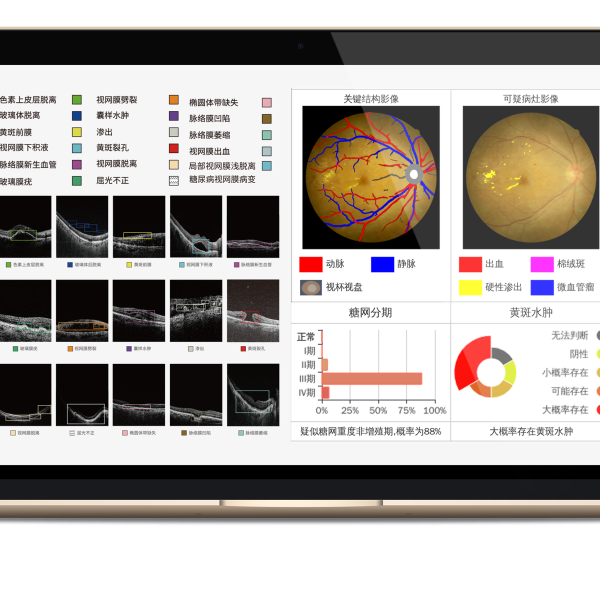




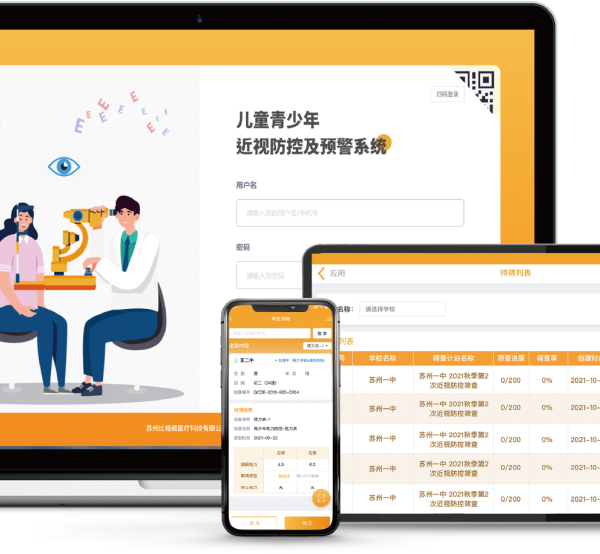




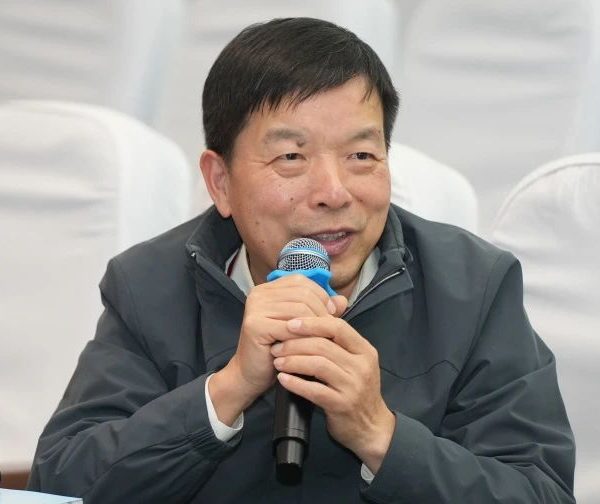

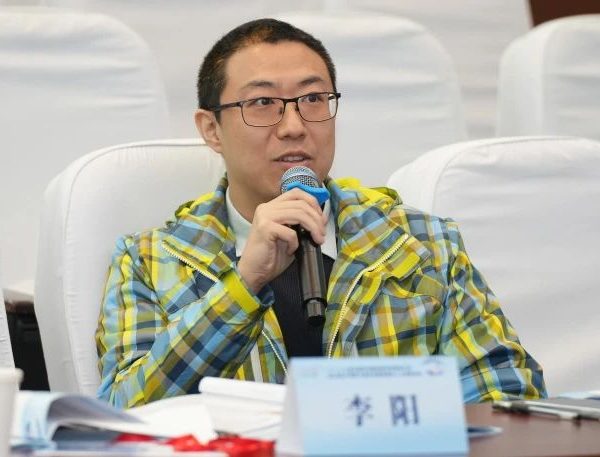



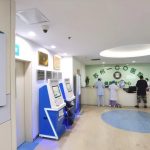




No comments yet.